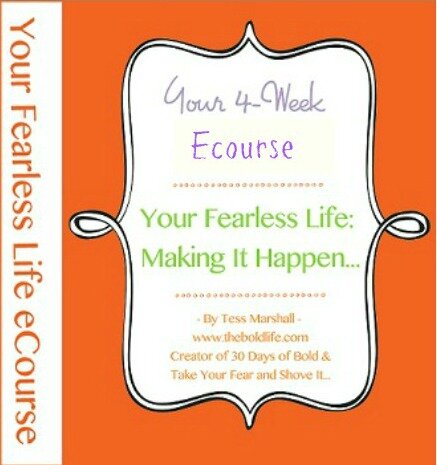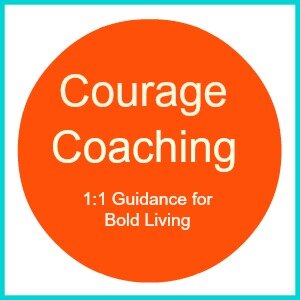We can embrace fear and choose to change.
The problem is we don’t like change. It's hard work. It requires facing painful and difficult emotions. It requires us to surrender the status quo.
A few of my past life changes
I have accepted fear as a part of life – specifically the fear of change…I have gone ahead despite the pounding in the heart that says: turn back. ~Erica Jong
- I chose to see a therapist and healed my past.
- I chose to quit smoking and I began running.
- I chose to become a vegetarian.
- I began studying A Course In Miracles.
- I finished graduate school.
- I opened a private practice as a therapist.
- I started a blog and a coaching career.
- I moved from Michigan to Arizona.
- I decided to be a happy person.
- I decided to live life on my own terms.
- I chose to be responsible about money.
A few small changes and ongoing changes
- I began green juicing.
- I let go of the need to be right.
- I keep a gratitude journal.
- I choose to be positive.
- I choose to continue to grow.
- I think of myself as a forgiving person.
- I love and accept everyone, including you.
Fear of change is the reason we resist anything.
In many circumstances, we refuse to change until our backs are up against the wall.
Life consists of twists, turns, good fortune, and disappointment. Instead of avoiding your problems and lessons, it’s possible to learn from experience, embrace change and live a fabulous life.
In order to grow you have to change.
Change allows you to experience life differently. Change makes you a stronger person. It’s your responsibility to make your life better.
Things change when you make the decision to change:
Become an open-minded person.
Choose to listen more and talk less.
Change your attitude.
Decide to face your fears.
Embrace diversity.
Decide to believe in yourself.
Choose to be a more loving person.
Opt out of being right.
Learn to love and respect yourself.
Surrender what you cannot change.
Begin to appreciate your life today.
Expect the best.
The changes you make will affect those closest to you in a positive manner.
Get clear about what you need to change, why you need to change, and how you will monitor your success.
1. Decide what you will change.
To help you get clear finish this sentence, “My life would be better if I changed ____________."
The following are some additional suggestions for change:
Exercise more
Get more sleep
Find a different job
Increase face-to-face communication with others
Manage your moods
Spend less
Save more
Move to another city
Learn a new skill
Watch less television
Strive less and thrive more
Save for a vacation
Become a more loving person
Read more
Become a forgiving person
Join a support group
Choose to include more fun and play in your day
2. Write down why you need to change and the benefits of making a change.
I need to change my eating habits because of high blood pressure. The benefits are weight loss and good health.
I need to save more money. The benefits are having an emergency fund and financial freedom.
I need to keep a gratitude journal. The benefits are feeling satisfied and creating well-being.
I need to establish a morning ritual. I benefit by staying calm and centered through out the day.
Turbulence is life force. It is opportunity. Let's love turbulence and use it for change. ~ Ramsay Clark
3. Write down obstacles that may prevent change.
For example, your “inner critic” is sabotaging your efforts.
I can’t handle it.
I don’t have time.
I don’t have enough money.
I’m comfortable, even though I’m miserable.
I don’t have enough support.
I’m afraid of failure.
I’m afraid of what others will think.
It’s not really that bad.
I’ll start tomorrow.
Change your thoughts and you change your world. ~Norman Vincent Peale
4. Write down solutions for each obstacle.
Change what you are telling yourself. Make up a new story.
I can do it one day at a time.
I can ask my best friend for support.
I can start my day an hour earlier.
I can be positive. I will succeed.
Now is the best time to begin.
Small and consistent steps are the best way to begin. It makes change easier. You don’t have to leap out of your comfort zone.
If you want to save money, begin saving all of your change. If you want to eat healthier, include one or two new vegetables in your diet, each week. As you accomplish one small step, take another.
5. Use proven tools to create change.
Breathe. Learn to slow down your pace. Breathe in “I am calm” breathe out “I am safe.”
Use inspirational material. Learn to motivate yourself when you feel like giving up.
Get support. Find an accountability partner, hire a therapist, or join a support group. These three things require you connect with others for your emotional and mental health.
Read affirmations. They help counter act your negative thoughts. Write them on index cards with colored markers. Keep a few in your purse, on your night stand and in your car. Read them several times a day.
Slow down. Change doesn't happen overnight. Be patient with yourself and others. Remind yourself to take one step at a time, one day at a time. Live mindfully.
Get outside. Nature is calming and healing. Spend at least 15 minutes outside daily.
Shake up your routine. If you want to lose weight, stop eating in your car. If you want to spend less, stop all recreational shopping. Replace these habits with a positive change.
Keep a journal. The process of writing things out makes it “real.” There is less room for denial. Write down your successes and failures. Write out your feelings. Write out your plan. When you want to give up, write.
Think of the worst case scenario that could result from making a change. Create possible solution. Be prepared.
Be kind. Be your own best friend. Never berate yourself for failing. Begin again, start over as often as it takes.
Move. Physical movement makes you feel good. When you feel good you do good.
Have a spiritual plan. Be connected through prayer, silence or meditation. Be connected to a higher power, God, Buddha, or what ever is right for you.
To quit an addiction you will need professional help and a lot of support. I have heard clients say, “I can quit on my own. I quit for six months, once.” My reply is, “You stopped, you didn't quit.Quitting is forever.”
Roughly one third of the population continues to smoke, knowing it’s a deadly habit. An addiction requires a "one day at a time approach." Addicts are required to change the people, places and things that they are triggered by.
A.A. teaches that one of three things will happen over time, to an addict that fails to change. An addict will eventually go to prison, a mental institution or die.
Resolve, courage, and fortitude. These qualities will become stronger as you proceed down the path of change.
In conclusion, there are unlimited tools available to change your life and fuel new habits. Your life won't change until you decide to change it. Decide today!









Dear Tess, boy am I proud of you for Green Juicing! And for keeping it up. You have an amazing and contagious spirit and keep me inspired, you really do. You walk your talk – facing the fears and making *THEM* shiver in their place because you are certainly not afraid of a thing. Keep this up and thanks so much for the link love!